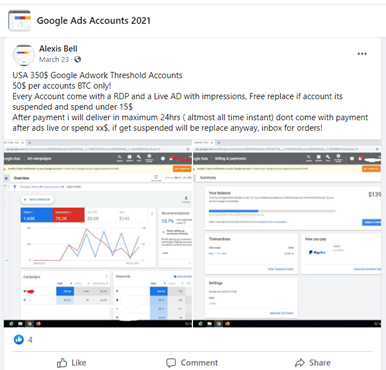Let’s talk about everyone’s favorite subject in digital marketing: oversight and ethics. Specifically, how the lack of one brought the other into question.
In this piece, we’ll take a quick trip down memory lane to see just how we got to the state SEM/PPC ethics are in today.
Then you’ll find 10 ethically questionable practices that are happening across the industry.
For each one, we’ll take a look at why it’s potentially problematic, whether it’s unethical or actually illegal, and whether oversight of some type could help.
Full transparency, an episode or two of Real Housewives inspired this article. Let’s get to it.
Learning to Spot Ethical Grey Areas in SEM
I started in SEM some 16 years ago, and one thing I noticed is that there was almost no oversight from any party other than the search engines themselves.
Because of the lack of oversight, there were a lot of shady and questionable practices within the space.
Some were well worth an indictment or subpoena. But with a lack of regulations and oversight, it was hard to say if an operation was being unethical.
Still, you knew it when you saw it.
How little oversight was there in the SEM space? It wasn’t until 2009 that the FDA stepped in.
Finally, it told pharma companies and Google/Yahoo (Bing wasn’t there yet) that advertisers need to start complying or get fined.
For a fun read, here is the 2014 version of the FDA guidance — but before 2009, it was left up to the brand’s legal team to interpret the rules.
The moment you fail to comply with any form of government regulation within the industry, your operation’s ethics come into question.
Then you get letters from places like the FDA.
A perfect example is this one from 2020, scolding Outlook Pharmaceuticals for their ethically questionable practices that did not align with the federal guidelines.
So that begs the question, in an industry whose oversight resembles the chaos of someone asking for seconds at Thanksgiving before everyone has had their first serving, what is and isn’t considered ethical practice?
What is a grey area?
And who gets to decide that?
Partial spoiler… To save time on the “who” part, I’ll give you a quick answer: No one. There is no formal oversight board in SEM.
However, most anyone who has been in the space for more than a handful of years or more can easily help point out the inappropriate and unethical players and practices.
It is the unwritten responsibility of these industry experts to bring awareness to this (preferably without doxing), to help aid in stopping the practice.
(Side note, if you want to see who some of the industry leaders are, go to Twitter at 12 pm EST every Tuesday and follow #ppcchat hashtag.)
Now to address the topic of ethical/unethical practices.
Yes, some of this is considered subjective (i.e., selling/leasing Google Ads accounts to unknown overseas third parties). Some of it is pure cut and dried, blatantly wrong/unethical, and potentially illegal (i.e., pretending you work for Google).
Here’s my personal opinion (although shared with many) of things that are and are not considered unethical, and whether oversight could aid in it.
1. Renting or Leasing an Ads Account from a Third-Party Source (or Even Worse, Selling Them)
Yes, it is highly unethical (and potentially illegal, depending on the funding source).
This practice has been around for a while. I’ve found multiple social media groups (and oddly some ads on Google), that facilitate the sell/leasing/renting of Google, Bing, and Facebook ads accounts.
It’s safe to assume that if you’re running into this, something illegal has either already gone down — or is about to.
Never engage in this practice. If someone in your operation is doing it, you do not need/want them in your operation.
Could Oversight Help?
Oversight can help prevent or slow this but is unlikely to stop it.
Google has started requiring advertiser verification and it helps marginally, but without a formal law in multiple countries or threat of legal action at the point of sale, this practice will run rampant.

Above is a Facebook Group selling Google Ads Accounts. Yes, I did flag the group, in case you’re wondering.
2. Operation Claims They Work at/for Google in a Cold Call/Pitch Scenario
This is an incredibly common practice by predatory freelancers/agencies. It is in fact misrepresentation of a company.
While I don’t know the full legalities, I believe we all recall in 2018 when Google filed a suit with the FTC on 5 agencies in Florida, who took part in this practice (part of it was also tied to a robocalling scheme as well).
I shouldn’t even have to say this, but yes, this is also highly unethical.
Could Oversight Help?
If there was a formally certified oversight board that could provide a license/verification of agencies/freelancers, etc (i.e., a verifiable ID for advertisers), this has the potential to reduce this practice.
3. Package/Bundle Pricing on the Website or Formal Price Quotes Before the Work is Scoped
This is incredibly common, and not an illegal practice at all. This is most commonly seen on operations that target SMB’s (small-medium businesses) and/or those who want a “one-stop shop.”
But here is the reality for all, the work is often never what one thinks it will be.
Pricing out the work, or giving the rate, before one even knows what is entailed (i.e., asset builds, tagging, reporting, meetings, etc.) is often a recipe for disaster.
The work may be much more than the price or much less than the price, and in the end, the brand is the one most likely to lose out (either overpaying or getting substandard work).
This is a gray area and can vary from scenario to scenario.
Could Oversight Help?
Oversight by aggregate marketing or advertising board could help prevent these scenarios, but it really isn’t an issue with large advertisers/agencies, only the small operations targeting small businesses.
So it ultimately comes down to those who are seeking an SEM service, to truly do their homework.
4. Agency Claims They are Best in Google Ads/Bing Ads, etc.
This is truly subjective (i.e., I say I am the #1 Ad Agency on Google Ads, but what I didn’t say is that I am the #1 Ad Agency on Google Ads in my zip code, providing you don’t try and verify it).
It may be true and they are, but a lot of operations claim that.
This also technically violates Google’s Misleading Representation policy. Is it is another gray area.
When an operation makes the claim with a certifiable verification from a non-shell company style operation, then it is still gray area.
If they make the claim without the backup, then it is unethical.

Could Oversight Help?
Google does have editorial policies to enforce then, from the ad perspective only, but this is another scenario where a governing/oversight board could crackdown and prevent deceptive practices.
An easier way would even be having the FTC taking a hand in this to prevent “Flagrant False Advertising”
5. Lack of Access and Transparency
This is truly one of the most infuriating things I’ve come across in the SEM space.
This is when a freelancer or agency is running programs on behalf of a brand, and they do not provide the brand access into the accounts and provide little to no transparency.
Giving a brand direct access to their own data is fine, just put it as read-only, so they don’t accidentally delete anything.
This also helps them further trust how their money is being spent.
And any operation that takes part in this activity is, likely unethical.
There are probably one to two potential reasons why they aren’t giving access that wouldn’t be unethical (i.e., they run multiple clients in a single account, instead of separate ones), but those reasons just expose poor business management.
Could Oversight Help?
There is no oversight for this. It is something the brand and the operation they engage with must hash out in a contract in advance of going live.
6. Mimicking an Ad
This happens when someone copies another advertiser in the spaces ad, roughly word for word, and the only differentiating factor is the display URL.
This used to be a problem years back, especially with personal injury lawyers and cable companies, but not so much these days.
This is a bit of a gray area. Yes it is deceptive, but there are also steps an advertiser can take with the engines to prevent this from happening when trademarks are involved.
Could Oversight Help?
Oversight here is limited. Not really much can be done here if the mimicker is not using trademarked content.
If they are however, and the engines have stepped in already, then it’s time to alert Larry down in your legal department to handle it.
7. Collaborating with Other Brands to Control Pricing in the Space
When doing this cooperatively or through bullying/intimidation, I cannot stress this enough – this not just unethical, but also illegal (this is in fact known as collusion).
Shockingly rampant as well, rarely done via email, usually done by phone or in person. It’s a great way to have the FTC in your business.
It is also not just limited to small shops and operations, 1-800 Contacts engaged in this practice and felt the wrath of the FTC (i.e., Intimidation and collusive behavior lawsuit brought on by the FTC on 1-800 Contacts).
Could Oversight Help?
There is oversight here, not actually done by the search engines for once, but by the government.
The issue here is that smaller brands often don’t know it is illegal, and enforcement is purely reactive.
Tighter regulation that is proactive and a dedicated tip line can help cut this down.
8. Using the Agency/Freelancer’s Preferred Tools/Platforms
This is a frequent scenario all the time. You get pulled into a research tool or an ad server that the operation favors.
They may do it because it is great technology, they may do it because they get a reseller kickback – that is perfectly fine. Preferred contracts have existed as long as business.
But you as an advertiser have the right to request an explanation of why the use vendor x, and you can also request an RFP if you’re unsatisfied.
If they refuse to explain themselves, then it becomes unethical, and may not be an operation you want to work with.
Could Oversight Help?
There has been a debate for a while on operations getting kickbacks on these types of contracts with vendors. Unfortunately, little has been done by outside entities. The ANA, who acknowledged the issue, but can’t stop it.
9. Marking Up Media Costs as a Payment Model and Then Overdelivering on Traffic
There are compensation models based on hours, some on retainer, some on a markup of CPC, and some on media spend. These are all fine.
But on the last two, there are several documented scenarios, where an agency purposely over-delivers on traffic volume or generates a less efficient CPC, to pad their compensation.
This is not right, it is unethical.
This is also one of the reasons I recommend never agreeing to a price until the operation properly scopes out the work. If they do this model, limits must be determined on total compensation and contingencies on efficiency.
Could Oversight Help?
There is no formal oversight that is done here, I’ve had this go to civil court many times. The only way to prevent it is to have all the parameters and contingencies built into the contract. Do not pay the management fee (not media spend, but management) until the prior billing period has been properly reviewed.
Now for the most common one I’m asked about:
10. Competitor Bidding/Conquesting
Those that are not familiar, that is when in SEM, you bid on a competitor’s name, in an effort to divert traffic from them.
This has been in the news over the past couple of years, with big-name brands complaining about it. For example, Basecamp’s CEO complained in 2019 about having to bid on brand keywords, because their competitor also bid on them.
Now, 1800 Contacts is actually suing competitor Warby Parker, claiming the practice was deceptive and a trademark infringement.
This is not unethical at all, it is perfectly fine and legal to do.
It’s the same concept of someone placing an ad on a highway billboard that is next to a competitor’s location.
For those complaining, I’m sorry but this is an inherent cost of doing business within SEM.
It becomes unethical, is if the competitor uses your trademark in their ad while doing that.
Could Oversight Help?
No oversight is needed here at all. Advertiser education is truly what is needed.
The Takeaway
To be honest, this article went much longer than I expected it to. There is clear evidence that our industry needs oversight, transparency, and consequences.
For now, “community enforcement” of proper and improper practices is proving to be the most impactful.
But remember this: Questionable and unethical practices most commonly originate from the operation that is doing the work.
Make sure you thoroughly vet the team you’re going to have handling your account and campaigns.
Also, competitor bidding is not unethical or illegal. If you plan on suing a competitor, make sure you’re actually in the right first and not just being petty.
Disclosure: I am not a lawyer. These statements do not necessarily represent my employer and are specifically my own opinions.
More Resources:
- What Is Ethical PPC?
- 9 PPC Mistakes That Impact Success
- PPC 101: A Complete Guide to PPC Marketing Basics
Featured image: Red Deer/Shutterstock


